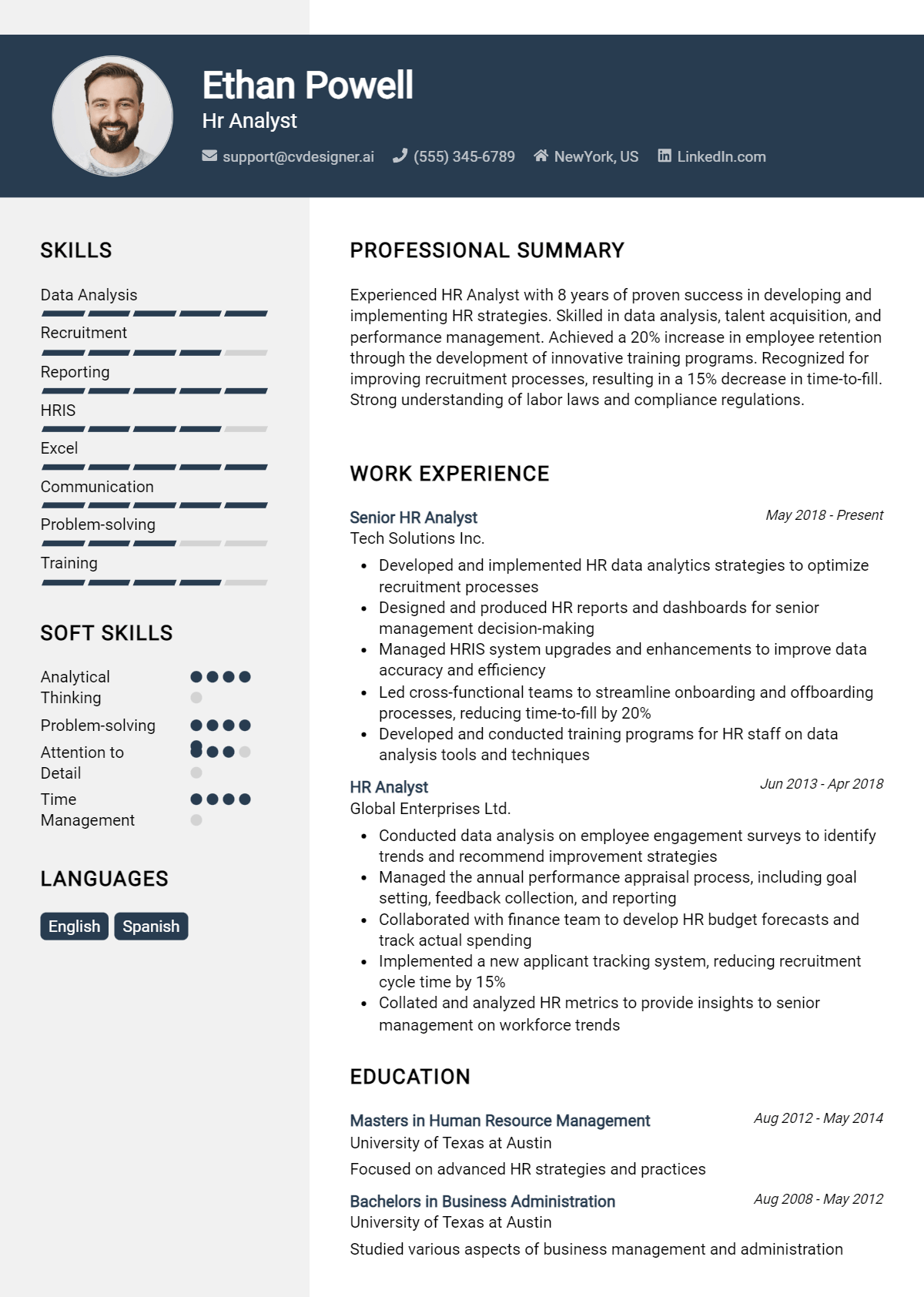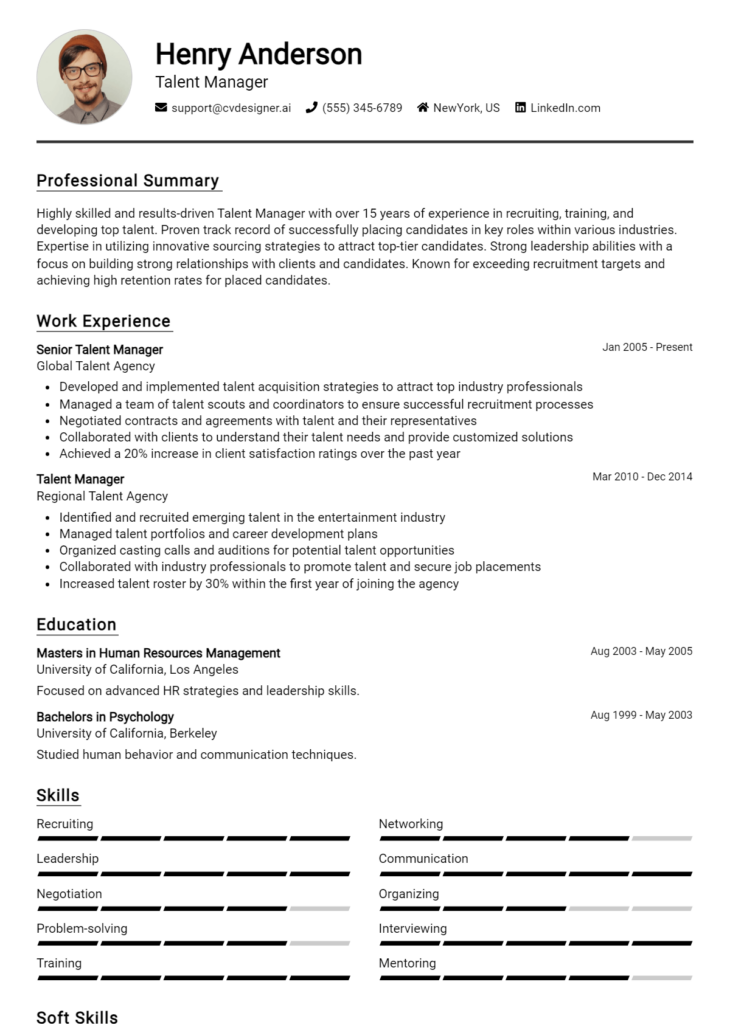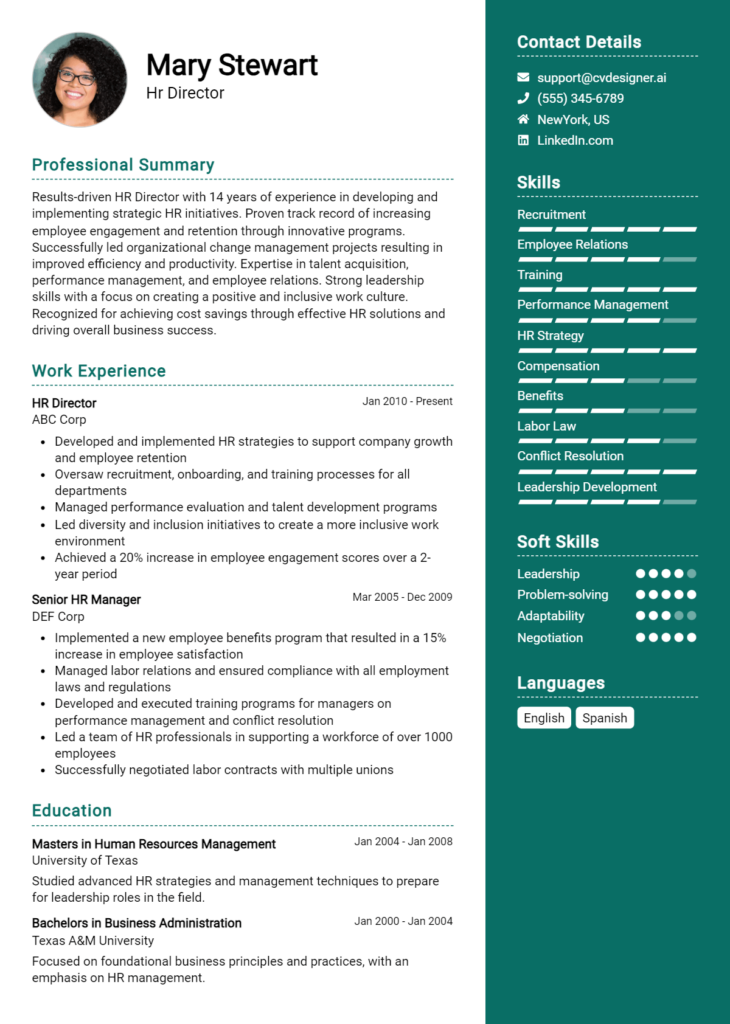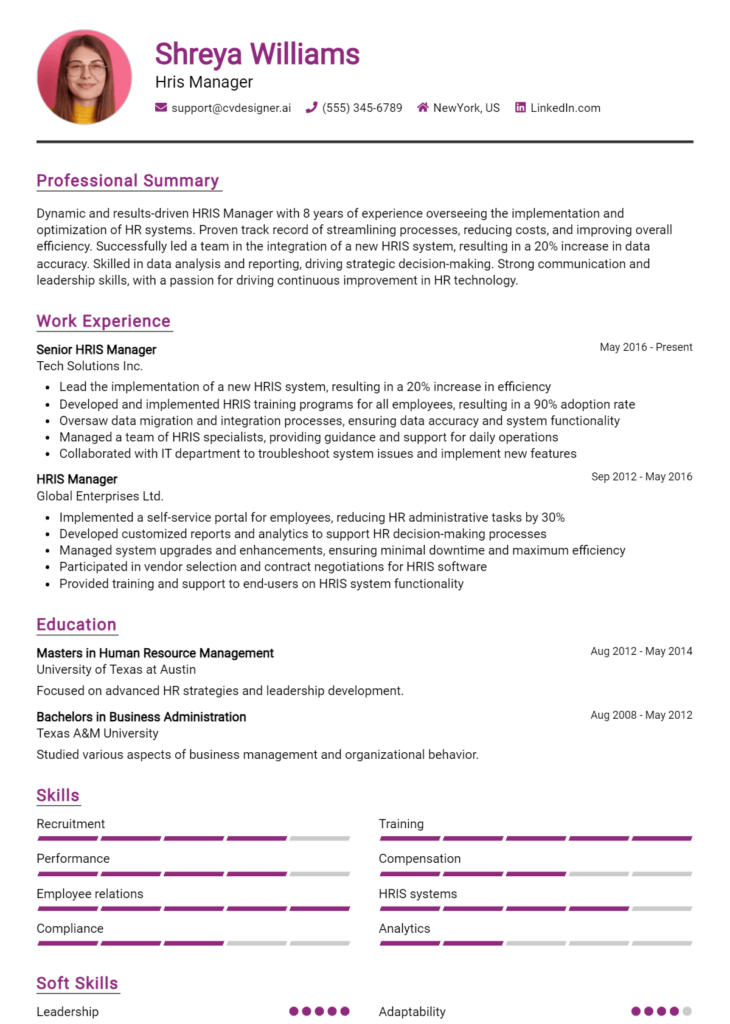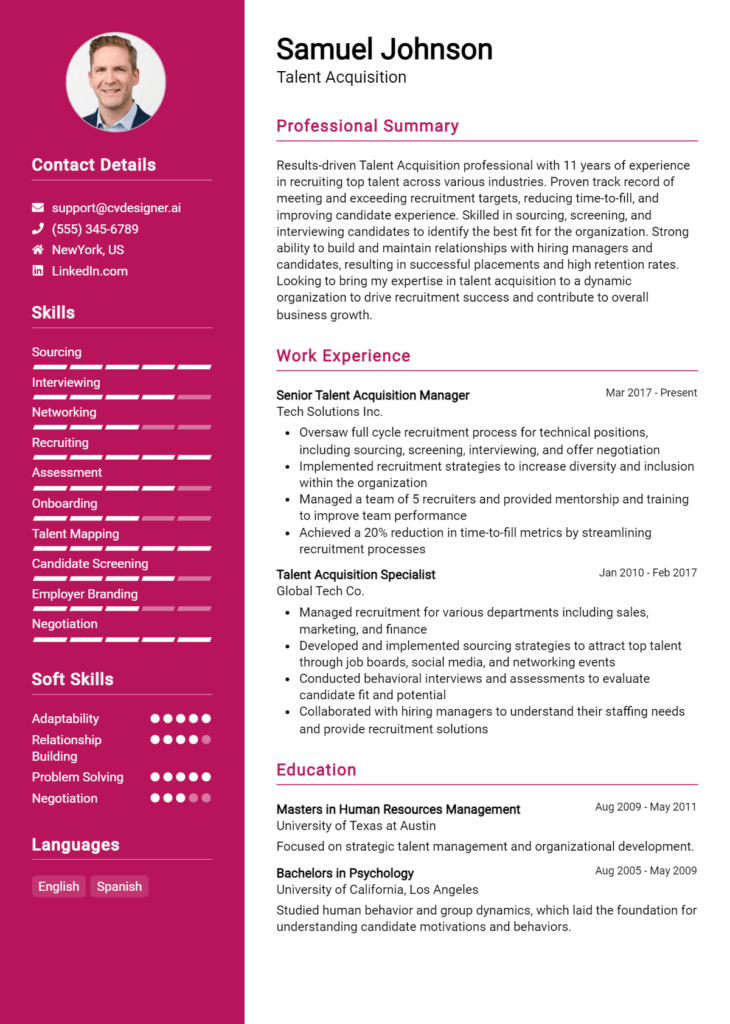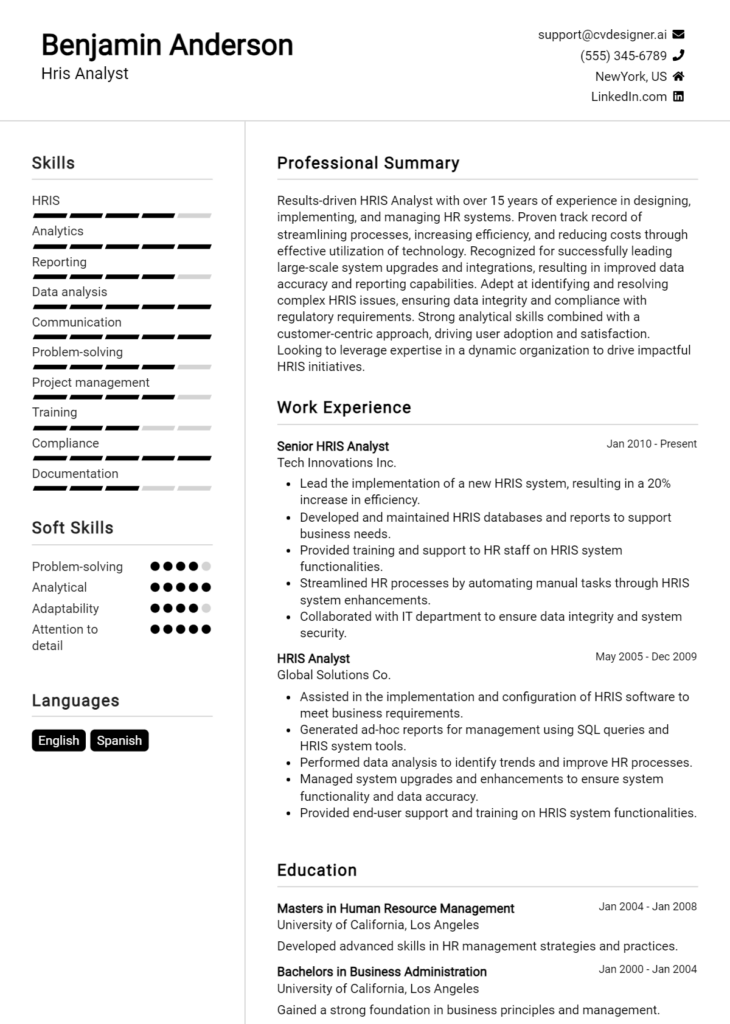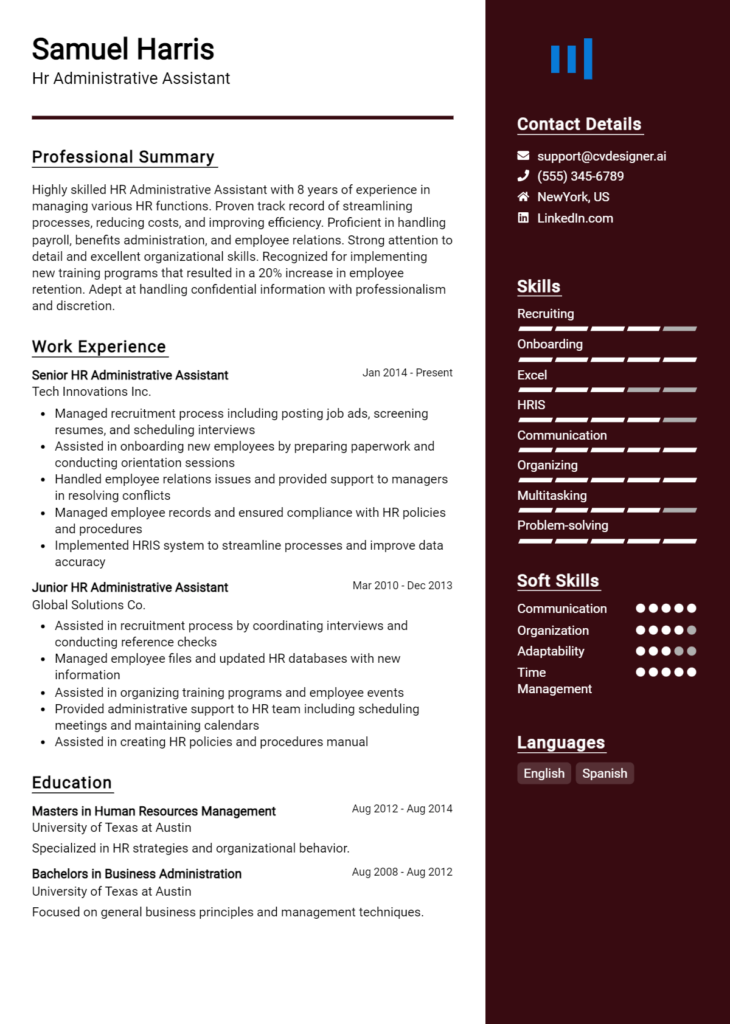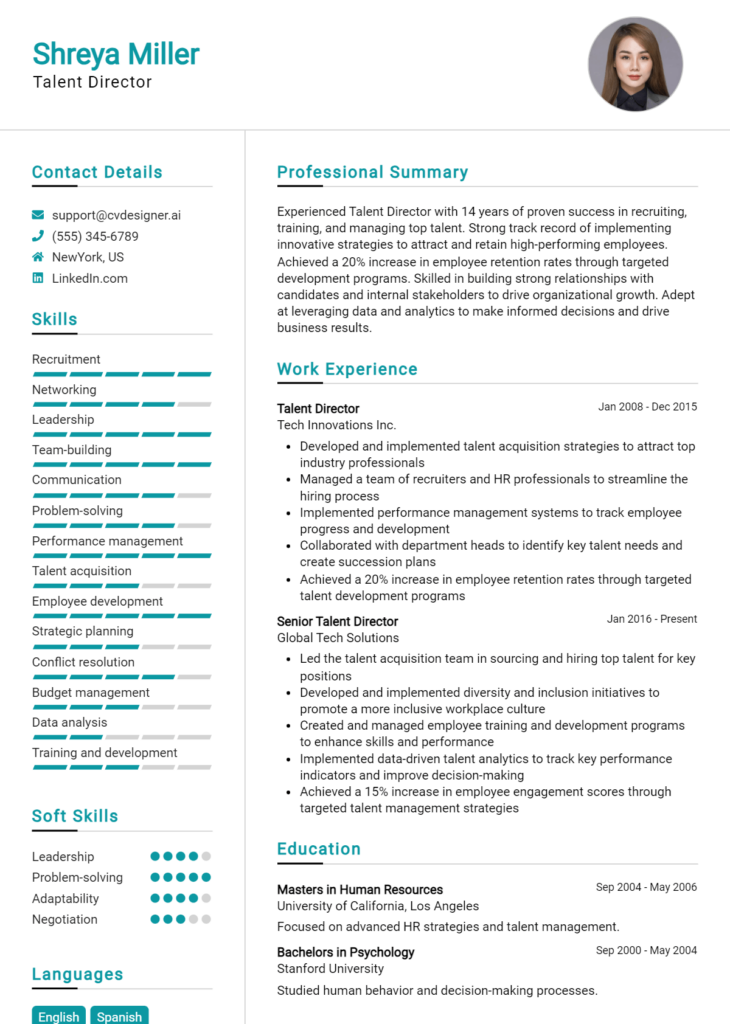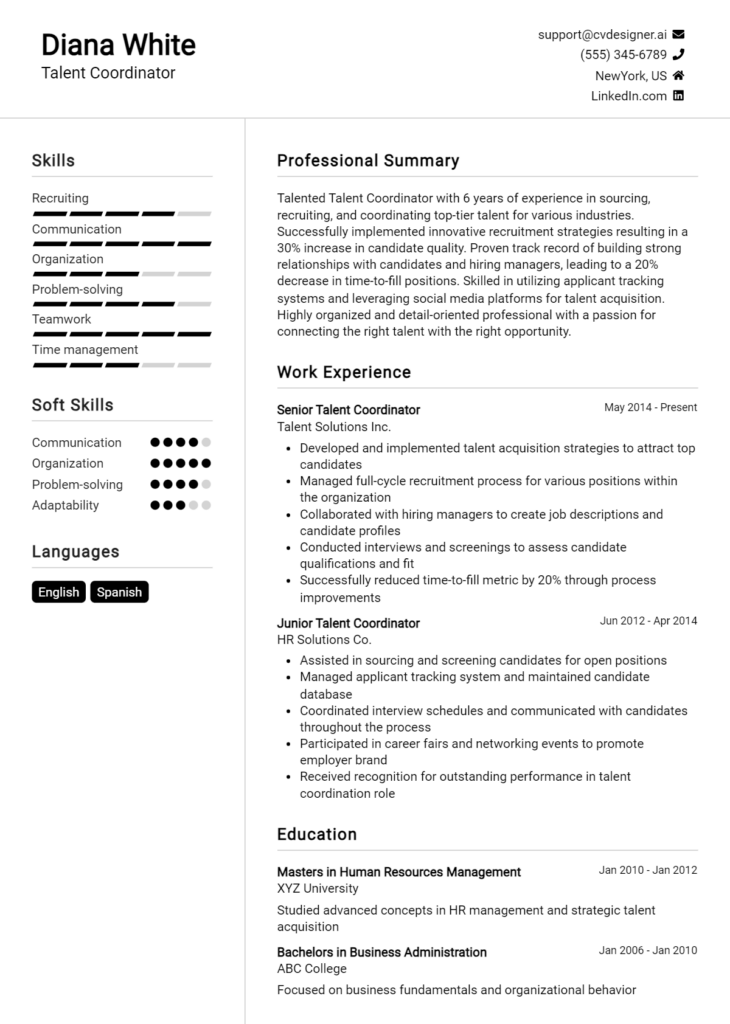Most Popular Hr Analyst Resume Examples
Explore additional Hr Analyst resume samples and guides and see what works for your level of experience or role.
As the heartbeat of any organization, HR Analysts play a crucial role in shaping the workforce and driving strategic decisions that influence the overall success of a company. Their analytical skills help decode complex data related to employee performance, recruitment, and retention, making them invaluable assets in today’s data-driven HR landscape. Crafting a compelling resume is essential for aspiring HR Analysts to stand out in a competitive job market, showcasing not only their analytical prowess but also their understanding of human resources. A well-crafted resume can be the difference between landing an interview and being overlooked, making it imperative to present your skills and experiences effectively.
In this comprehensive HR Analyst resume writing guide, we will delve into the essential components of a winning resume. We'll explore the key responsibilities and skills that hiring managers look for, the best formats to adopt for various experience levels, and common mistakes to avoid that could hinder your chances of getting noticed. Additionally, you'll find resume examples tailored for all experience levels, along with practical tips on crafting your resume and selecting the right templates to enhance your presentation. Whether you're a seasoned professional or just starting your career in HR, this guide is designed to equip you with the knowledge and tools you need to create a standout resume that captures attention and showcases your unique qualifications.
Key Responsibilities and Skills for a HR Analyst
As an HR Analyst, individuals play a crucial role in supporting the human resources department by analyzing data and providing insights that help improve HR processes and strategies. The key responsibilities of an HR Analyst typically include:
- Data Analysis: Collecting, analyzing, and interpreting HR data to identify trends and make informed recommendations.
- Reporting: Preparing detailed reports on HR metrics, such as turnover rates, recruitment efficiency, and employee engagement levels.
- Policy Development: Assisting in the development and implementation of HR policies and procedures based on data-driven insights.
- Employee Surveys: Designing and conducting employee satisfaction surveys to gauge workforce morale and engagement.
- Compliance Monitoring: Ensuring that HR practices comply with labor laws and regulations through meticulous data tracking and reporting.
- Collaboration: Working closely with HR teams and other departments to support strategic initiatives and foster a data-driven decision-making culture.
To excel in this role, the following essential skills are required:
- Strong analytical and quantitative skills
- Proficiency in HRIS (Human Resource Information Systems) and data management software
- Excellent communication and interpersonal skills
- Detail-oriented mindset with a strong focus on accuracy
- Ability to interpret complex data and present findings clearly
- Knowledge of labor laws and HR best practices
- Problem-solving skills and strategic thinking
Highlighting these skills effectively in the resume skills section is vital, as it allows potential employers to quickly assess your qualifications for the HR Analyst role. Tailoring these responsibilities and skills to match the specific job description can significantly enhance the effectiveness of your application. Consider how these skills could be relevant in creating a strong CV, as demonstrating your analytical capabilities and HR knowledge can set you apart from other candidates.
Best Resume Format and Structure for a HR Analyst
When crafting a resume for the HR Analyst role, it is crucial to select a format that highlights your skills, experience, and qualifications effectively. A combination or chronological resume format is often the best choice for showcasing your professional journey and achievements.
Contact Information
- Include your full name, phone number, email address, and LinkedIn profile (if applicable) at the top of your resume.
- Ensure that your email address is professional (e.g., firstname.lastname@gmail.com).
Professional Summary
- Write a brief 2-3 sentence summary that encapsulates your experience, key skills, and what you bring to the HR Analyst role.
- Tailor this section to the specific job you are applying for by incorporating relevant keywords from the job description.
Work Experience
- List your work experience in reverse chronological order, beginning with your most recent position.
- For each role, include the job title, company name, location, and dates of employment.
- Use bullet points to describe your responsibilities and achievements. Focus on quantifiable results (e.g., "Improved employee retention by 15% through data analysis and targeted engagement strategies").
- Highlight experiences that demonstrate your analytical skills, familiarity with HR metrics, and ability to interpret data to drive decisions.
Education
- Include your highest degree first, followed by the name of the institution, location, and graduation date.
- If you have relevant coursework or honors, consider adding those as well, especially if you are a recent graduate.
Skills
- Create a section that lists both hard and soft skills relevant to the HR Analyst position, such as:
- Data analysis and interpretation
- HR software proficiency (e.g., HRIS, ATS)
- Communication and interpersonal skills
- Problem-solving abilities
- Knowledge of labor laws and compliance
Certifications
- List any relevant certifications that enhance your qualifications as an HR Analyst, such as:
- SHRM Certified Professional (SHRM-CP)
- Professional in Human Resources (PHR)
- HR Analytics Certification
Tips for Choosing the Right Format:
- Opt for a clean, professional design that uses clear headings and plenty of white space to enhance readability.
- Use consistent formatting for dates and bullet points to give your resume a polished look.
- Choose a font size between 10 and 12 points to ensure legibility, and select a professional font style like Arial, Calibri, or Times New Roman.
Complementing Your Cover Letter Your resume format should align with your cover letter format to present a cohesive and professional application. Use the same font, color scheme, and header style for both documents. In your cover letter, refer to specific achievements from your resume to create a narrative that connects your experiences to the needs of the employer. This synergy between your resume and cover letter enhances your overall presentation and strengthens your candidacy for the HR Analyst position.
Writing Tips and Best Practices for a HR Analyst Resume
When crafting a resume as an HR Analyst, it's crucial to present your skills and experiences in a clear and compelling manner. Begin by tailoring your resume to the specific job you're applying for, ensuring that you highlight relevant experiences and qualifications that align with the role. Utilize a clean and professional format to enhance readability, and remember to include a summary that succinctly captures your expertise in HR analytics and data interpretation. To stand out, incorporate action verbs that convey your achievements, and quantify your contributions wherever possible to demonstrate the impact you've made in previous roles. Using industry-specific keywords will also help your resume pass through applicant tracking systems, ensuring it reaches hiring managers effectively.
- Use action verbs such as "analyzed," "implemented," and "streamlined" to convey your accomplishments.
- Quantify your achievements with specific figures or percentages to highlight your impact, e.g., "Increased employee retention by 15% through targeted recruitment strategies."
- Incorporate industry-specific keywords related to HR analytics, such as "data analysis," "employee engagement," and "regulatory compliance."
- Tailor your resume for each position by aligning your skills and experiences with the job description.
- Keep your formatting consistent and professional, using clear headings and bullet points for easy reading.
- Highlight relevant certifications or training in HR analytics to emphasize your qualifications.
- Include a summary statement at the top of your resume that encapsulates your experience and career goals.
- Remember to apply these writing practices not only to your resume but also when drafting your cover letter for a cohesive application package.
For more insights, consider exploring resume writing tips to ensure your document has a professional look. Additionally, think about how these practices can enhance your cover letter to make a strong first impression.
Common Mistakes to Avoid in a HR Analyst Resume
Crafting an effective HR Analyst resume is a crucial step in securing a position in the competitive field of human resources. However, many candidates fall into common pitfalls that can undermine their chances of getting noticed by hiring managers. By steering clear of these mistakes, applicants can present their qualifications more effectively and make a strong impression. Below are some common mistakes to avoid in your HR Analyst resume:
- Overloading the resume with excessive information, making it difficult to read.
- Using generic job descriptions that fail to highlight specific achievements or skills.
- Failing to quantify accomplishments, which can diminish the impact of your contributions.
- Ignoring the importance of tailoring your resume for each job application.
- Including irrelevant work experience that does not align with HR Analyst responsibilities.
- Neglecting to highlight key HR software and analytical tools you are proficient in.
- Using outdated or unprofessional formats that detract from the content.
- Skipping a summary or objective statement that clearly outlines your career goals.
- Not proofreading for spelling and grammatical errors, which can reflect poorly on attention to detail.
- Overuse of jargon or technical language that may confuse hiring managers.
To further enhance your application materials, consider reviewing additional resources on common mistakes to avoid in a resume as well as common cover letter mistakes to ensure your overall presentation is polished and professional.
Sample HR Analyst Resumes
As organizations increasingly recognize the importance of data-driven decision-making in managing human resources, the role of an HR Analyst has become crucial. This position requires a unique blend of analytical skills, attention to detail, and an understanding of HR practices. Below are three sample resumes tailored for different levels of experience: an experienced HR Analyst, an entry-level candidate, and a career changer. These examples can serve as a guide to help you craft your own resume. For more inspiration, be sure to explore additional resume templates. Additionally, don’t forget to check out cover letter examples to complete your job application package.
Experienced HR Analyst Resume
Jane Doe
123 Main St, Cityville, ST 12345
(555) 123-4567
jane.doe@email.com
Professional Summary
Results-driven HR Analyst with over 7 years of experience in data analysis, workforce planning, and performance management. Proven ability to leverage HR metrics to drive strategic initiatives and improve organizational effectiveness. Strong communicator with a passion for enhancing employee experiences.
Core Competencies
- Data Analysis & Reporting
- HR Metrics & KPIs
- Employee Engagement Strategies
- Performance Management Systems
- Recruitment & Talent Acquisition
- Compliance & Risk Management
Professional Experience
HR Analyst
XYZ Corporation, Cityville, ST
March 2018 – Present
- Developed and implemented HR metrics that improved recruitment efficiency by 30%.
- Conducted workforce planning analysis to identify skills gaps and inform training programs.
- Collaborated with cross-functional teams to enhance employee engagement scores by 20%.
HR Specialist
ABC Inc., Cityville, ST
June 2015 – February 2018
- Analyzed employee turnover data and proposed initiatives that reduced turnover by 15%.
- Provided analytical support for performance management programs and succession planning.
- Assisted in the implementation of a new HRIS that streamlined data collection and reporting processes.
Education
Bachelor of Science in Human Resource Management
University of Cityville, Cityville, ST
Graduated May 2015
Entry-Level HR Analyst Resume
John Smith
456 Elm St, Townsville, ST 67890
(555) 987-6543
john.smith@email.com
Professional Summary
Detail-oriented recent graduate with a Bachelor’s degree in Human Resource Management. Eager to leverage analytical skills and knowledge of HR practices to support data-driven decision-making. Strong ability to communicate effectively and collaborate with team members.
Core Competencies
- Data Entry & Analysis
- HR Software Proficiency
- Recruitment Assistance
- Employee Relations
- Microsoft Excel & Access
- Attention to Detail
Education
Bachelor of Science in Human Resource Management
University of Townsville, Townsville, ST
Graduated May 2023
Internship Experience
HR Intern
DEF Solutions, Townsville, ST
January 2023 – April 2023
- Assisted in the collection and analysis of employee data for performance reviews.
- Supported recruitment efforts by screening resumes and scheduling interviews.
- Contributed to the development of employee engagement surveys and compiled results.
Volunteer Experience
HR Volunteer
Local Non-Profit Organization, Townsville, ST
September 2022 – December 2022
- Helped organize volunteer recruitment events and maintained applicant tracking records.
- Developed training materials for new volunteers and assisted in onboarding.
Career Changer HR Analyst Resume
Emily Johnson
789 Maple Ave, Hometown, ST 54321
(555) 321-0987
emily.johnson@email.com
Professional Summary
Dynamic professional transitioning from a successful career in sales to HR analytics. Possesses a strong foundation in data analysis and customer relations. Committed to applying analytical skills and business acumen to enhance HR processes and improve workforce efficiency.
Core Competencies
- Data Analysis & Visualization
- Sales & Customer Insights
- Problem Solving & Critical Thinking
- Team Collaboration & Leadership
- Project Management
- HR Software Familiarity
Professional Experience
Sales Representative
GHI Company, Hometown, ST
June 2017 – September 2023
- Analyzed sales data to identify trends and customer preferences, contributing to a 25% increase in sales.
- Collaborated with cross-functional teams to improve customer satisfaction metrics.
- Trained and mentored new sales staff on best practices and data analysis techniques.
Education
Bachelor of Arts in Business Administration
Hometown University, Hometown, ST
Graduated May 2017
Certifications
- Google Data Analytics Professional Certificate
- SHRM Certified Professional (in progress)
These resumes illustrate how different backgrounds can effectively highlight relevant skills and experiences for an HR Analyst role. Whether you're just starting your career, have years of experience, or are transitioning from another field, tailoring your resume can significantly enhance your job application. Don't forget to explore more resume templates and corresponding cover letter examples to create a complete job application package.
Checklist for a HR Analyst Resume
- Proofread for Errors: Carefully check for spelling, grammar, and punctuation errors. Even minor mistakes can create a negative impression.
- Check Formatting Consistency: Ensure that font types, sizes, and styles are consistent throughout the document. Use the same alignment and bullet points for similar sections.
- Tailor Your Resume: Customize your resume for the HR Analyst position by incorporating keywords from the job description. This helps demonstrate your fit for the role.
- Highlight Relevant Skills: List skills that are particularly relevant to the HR Analyst position, such as data analysis, HRIS proficiency, and compliance knowledge.
- Quantify Achievements: Whenever possible, include metrics or quantifiable achievements to showcase your impact in previous roles (e.g., “Improved employee retention by 15% through data-driven initiatives”).
- Use Action Verbs: Start bullet points with strong action verbs like "analyzed," "developed," or "implemented" to convey your contributions effectively.
- Include Professional Summary: Add a brief professional summary at the top that encapsulates your experience, skills, and career goals as they relate to the HR Analyst role.
- Contact Information: Double-check that your contact information is accurate and up-to-date, including your phone number, email, and LinkedIn profile link.
- Keep It Concise: Aim for a resume length of one page, if possible, focusing on the most relevant experiences and skills to keep it concise and impactful.
- Utilize AI Tools: Consider using an AI resume builder to help ensure that all elements are well-organized and professionally presented.
A similar checklist can also be followed for creating a CV or cover letter.
Key Takeaways for a HR Analyst Resume Guide
In conclusion, crafting a strong HR Analyst resume is essential to making a lasting impression on potential employers. By utilizing the examples and tips provided in this guide, you can tailor your resume to highlight your skills, experience, and achievements effectively. As you take the next steps in your job search, consider downloading a professional resume template from resume templates or a tailored cover letter template from cover letter templates. For those looking for an easy way to create a standout document, our best resume maker offers user-friendly features to help you design an impressive resume. Additionally, following similar guidelines will be beneficial in crafting a compelling CV and an engaging cover letter. Take these steps to enhance your job applications and increase your chances of landing your desired role in HR!
